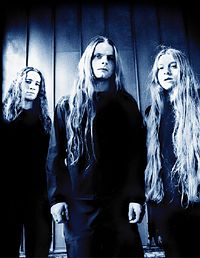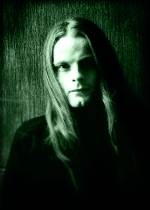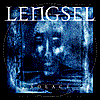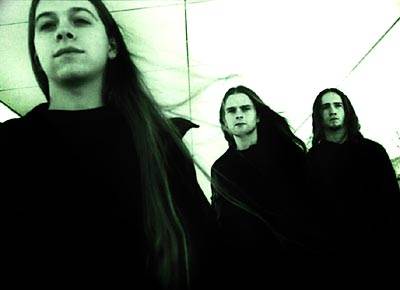|
"¡Eh Daga!, lamento [la demora] en responder, la he pasado mal tecleando en mi computador debido a una infección en mi brazo, ¡Ni siquiera puedo tocar guitarra! Sin embargo, aquí es la entrevista. Espero que la disfrutes."
tm
PG: ¿Cuáles son los nombres y la edad de los miembros de la banda?
Tor: Ole 23 - guitarra, John 23 - bajo, Tor 23 - guitarra, David 23 - batería, Peter 21 - voz. Ésta es la alineación de Lengsel hoy, todos en nuestros veinte años, de los años setenta.
|
"Hey Daga!, sorry about getting back to you, I have had a hard time typing my computer due to an infection in my arm, I can't even play guitar!
Anyway, here's the interview. Hope you enjoy it."
tm
PG: What's the name and age of the band members?
Tor: Ole 23, - guitar, John 23, - bass, Tor 23 - guitar, David 23 - drums, Peter 21 - vocals. This is the Lengsel line-up today, all in our 20s out from the 70s.
|
|
PG: ¿Cómo empezaron la banda, y cómo se volvió una banda "Black Metal Christiana"? {¿Es esa etiqueta adecuada?}
Tor:Nosotros formamos la banda alrededor del 95. En ese entonces Ole tocaba batería, John tocaba bajo, y yo estaba a la vez cantando y tocando la guitarra. Empezamos como una banda de Thrash-Metal, pero unos 2 años después, formamos Lengsel y decidimos tocar música más extrema. Queríamos tocar metal que fuera más que sólo punteos de guitarra. Supongo nos volvimos una " banda Black Metal cristiana " cuando los cristianos nos etiquetaron [así], nosotros no vemos que encajemos en llevar esa etiqueta, pero eso no parece poder ser evitado, ni tampoco importa realmente. Nuestro desarrollo musical fue gradual y todavía está en progreso en un alto grado.
|
PG: How did you start the band, and how did you become a "Black Metal Christian band"? {is that label accurate?}
Tor:We formed the band around 95. Back then Ole played drums, John played bass, and I
was both singing and playing the guitar. We started out as a thrash-metal band, but about 2 years later, we formed Lengsel and decided to play more extreme music. We wanted to play metal that was more than just guitar-riffs. I guess we became a "black metal Christian band" when Christians labeled us, we do not see ourselves fit to carry that tag, but that doesn't seem to be avoided, neither does it matter really. Our musical development went gradually and is to a high degree still in progress.
|
|
PG: ¿Cuáles son sus influencias musicales?
Tor:Nosotros escuchamos un montón de música diferente hoy en día. Hace 2 años yo diría que escuchábamos principalmente Metal, pero hoy pienso que estamos más abiertos cuando se trata de música. A veces parece como que queda poca música por explorar, entonces sólo tienes que buscar dentro de nuevo territorio e intentar encontrar cosas que podrías haber pasado por alto, o de otro modo podrías quedar pegado. Si no tienes ese problema, entonces no es gran cosa supongo.
|
PG: Which are your musical influences?
Tor:We listen to a lot of different music nowadays. 2 years ago I would say that we mainly listened to metal, but today I think we're more open minded when it comes to music. Sometimes it feels like there is little music left to explore, then you just have to search within new territory and try to find things you might have passed, or else you might get stuck. If you don't have that problem, then it's no big deal I guess.
|
|
PG: ¿Cómo pueden clasificar su estilo musical?
Tor: Nuestro estilo musical en "Solace" es Black Metal, pero nuestro nuevo material es mucho más que eso. Para mí la mayoría del Black Metal que es popular aquí en Europa carece del toque agresivo e intenso en la música. Nosotros intentamos ser creativos y hacer nuestra música más interesante para los oyentes y para nosotros mismos. Nuestra nueva alineación mejorará nuestro sonido y también completa la banda en ciertas formas.
|
PG: How can you pigeon hole {classify} your musical style?
Tor: Our musical style on "Solace" is Black-Metal, but our new material is much
more than that. To me most of the Black-Metal that is popular here in Europe
lack the aggressive and intense touch to the music. We try to be creative and
make our more music more interesting for both the listeners and ourselves.
Our new line-up will improve our sound and complete the band also in some ways.
|
|
PG: ¿Cuál es la temática de sus letras {en general}?
Tor: Todas las letras en "Solace" están basadas en algo que ha pasado en nuestras vidas, así que es seguro decir que tienen un acercamiento muy personal. Todas las letras, por cualquiera, son al final personales en alguna medida, o de otro modo no tendrían un significado o una percepción particular, pero unas veces es más difícil de individualizar que otras. En el caso de "Solace" esto está bastante claro, nosotros no intentamos ocultarlo, pero no significa que ellas sean buenas sólo para nosotros. Las letras personales tienen tanto aspectos positivos como negativos, por ejemplo se vuelven más "honestas," pero también pueden interpretarse mal, de hecho tienen un contexto escondido para el oyente. Pero todavía pienso que es posible para el lector identificarse con un sentimiento o ser tocado por nuestra entrega. Los temas en la grabación son principalmente universales, y para nosotros cosas con las que uno se enfrenta y se acaban.
Algunas de las letras en nuestro nuevo material serán definitivamente más generales, pero todavía tratan con el cuerpo interno, cerebro y corazón, bueno y malo. Muchos sienten que las letras en "Solace" son negativas, pero para nosotros ellas son positivas, sólo que no tan optimistas en una fase particular de la vida. Nosotros planteamos asuntos problemáticos como el dolor, miseria, etc., y solaz es el opuesto en el que uno puede encontrar consuelo.
|
PG: What's the subject of your lyrics {in general}?
Tor: All of the lyrics on "Solace" are based on something that has happened in our lives, so it's safe to say they have a very personal approach. All lyrics, by anyone, are in the end personal to some extent, or else they wouldn't have a meaning or a particular feel, but sometimes it's harder to spot than other times. In the case of Solace this is quite clear, we don't try to conceal it, but it doesn't mean that they are only good for us. Personal lyrics have both positive and negative aspects, for instance they become more "honest," but also they may be misinterpreted, they do have a context hidden for the listener. But still I think it's possible for the reader to identify with a feeling or be touched by our
outlet. The topics on the record are mostly universal, and for us things that are dealt and done with.
Some of the lyrics on our new stuff will definitely be more general, but still deal with the inner body, brain and heart, good and bad. Many feel that the lyrics on "Solace" are negative, but for us they are positive, just not so optimistic at a particular stage in life. We bring up problematic issues like pain, misery etc, and solace is the opposite in which one can find comfort.
|
|
PG: ¿Cómo te sientes al hacerte preguntas en inglés, si no es tu idioma nativo?
Tor: En Noruega tienes que aprender inglés en la escuela así que estamos como acostumbrados a esto supongo. Nuestro país es muy Americanizado, podrías decir. Es casi sólo nuestro idioma lo que nos hace diferente de los americanos, por lo menos si comparas con otros países. Si ha sido un tiempo largo desde que hemos hablado inglés, podría ser truculento ponerse realmente cálido, pero escuchamos inglés todos los días de todas maneras a través de la música, películas y en que no, así que no es realmente tan difícil.
|
PG: How do you feel being asked questions in English, if it's not your native language?
Tor: In Norway you'll have to learn English in school so we're kind of used to it I guess. Our country is very Americanized you could say. It's almost just our language that makes us differ from the Americans, at least if you compare with other countries. If it's been a long time since we've spoken English, it might be tricky to get real warm, but we hear English everyday anyway through music, films and what not, so it's really not that hard.
|
|
PG: ¿Escriben y/o actúan [cantando] sólo en inglés?
Tor: Hoy en día sólo tenemos letras en inglés, pero antes en el 95 cuando se formó Lengsel, escribimos la mayoría de las letras en noruego. En "Solace" hay 2 canciones donde yo canto en noruego, y la versión americana incluye una traducción inglesa de una de ellas creo yo. Escribir en noruego es más natural y más fácil de expresar pero no siempre suena tan bien, un poco torpe de hecho. El inglés es más común e internacional, y suena bien además.
|
PG: Do you write and/or perform {just} in English?
Tor: Nowadays we only have English lyrics, but back in -95 when Lengsel formed
we wrote most of the lyrics in Norwegian. On "Solace" there are 2 songs where
I'm singing in Norwegian, the American version includes an English translation of one of
them I think. Writing in Norwegian is more natural and easier to express but it doesn't
always sound that good, a bit awkward in fact. English is more common and international, and sounds good as well.
|
|
PG: ¿Hay alguna posibilidad que consideraran hacer por lo menos una canción en español para un próximo álbum?
Tor: Je-je. No creo, pero nunca se sabe.... Ninguno de nosotros conoce tu idioma lo bastante bien.
|
PG: Any chance you would consider to do at least one song in Spanish for an upcoming album?
Tor: he-he. I don't think so, but you'll never know....None of us knows your language
good enough.
|
|
PG: ¿Qué tal la aceptación para este tipo de música por los cristianos en tu país?
Tor: Donde yo vivo la aceptación es muy positiva. Soy parte de una iglesia aquí en Oslo cuyo nombre es SubChurch y la mayoría de las personas aquí está en la música metal/rock así que tenemos mucha retroalimentación. Esta iglesia también organiza un festival, llamado DP, cada año donde muchas de las bandas tocan, así que hay buenas relaciones.
|
PG: How's the acceptance for this type of music by Christians in your country?
Tor: Where I live the acceptance is very positive. I'm part of a church here in Oslo which name is SubChurch and most people here are into metal/rock music so we get a lot of feedback. This church also organizes a festival, called DP, each year where a lot of the bands play, so there are good relations.
|
|
PG: ¿Cómo es la "vida de iglesia" allá?
Tor: Yo pienso que es como en el resto del mundo. Los sermones son los domingos etc. Somos afortunados de ser parte de una iglesia llamada "SubChurch" qué es más como un tipo de grupo juvenil. Aquí encontramos gente con interés en la música y el arte, así que es fácil llevarse bien, y al mismo tiempo es más que sólo un club social.
|
PG: How's "church life" like over there?
Tor: I think it's like in the rest of the world. the sermons are on Sundays etc. We're lucky to be part of a church called "SubChurch" which is more like a youth group kind of thing. Here we find people with interest in music and art, so it's easy to get along, and at
the same time it's more than just a social club.
|
|
PG: ¿Qué piensan las bandas del ' mercado general ' {secular} de su música?
Tor: Las reseñas de "Solace" han sido hasta ahora muy positivas. La gente principalmente comenta sobre el sonido, lo que es comprensible, pero aparte de eso tenemos buenas críticas. No hemos andado en el ambiente tanto tiempo con nuestra grabación, pero nuestra primera impresión es buena.
|
PG: What do 'general market' {secular} bands think of your music?
Tor: The reviews of "Solace" has been very positive so far. People mostly comment on the sound, which is understandable, but apart from that we have good critics. We haven't been around that long with our record, but our first impression is good .
|
|
PG: ¿Tienen alguna relación con {los miembros de} Extol?
Tor: Sí la tenemos. ¡John y yo tocamos también en Extol! Ellos son algunos de nuestros mejores amigos y ¡Los apreciamos mucho! Yo conocí a Extol hace unos 2 años, y nunca había oído realmente su música antes. Se me preguntó si yo podría ayudarles tocando bajo en la próxima gira a E.U.A., dije que sí y he estado tocando desde entonces en la banda. La única diferencia ahora es que yo toco guitarra y John toca bajo.
|
PG: Do you have any relationship with {members of} Extol?
Tor: Yes we do. Both me and John play in Extol as well! They're some of
our best friends and we appreciate them a lot! I first met Extol about 2 years ago,
and had never really heard their music before. I was asked if I could help them out playing bass on the upcoming U.S. tour, I said yes and have been playing in the band since then. The only difference now is that I play guitar and John plays bass.
|
|
PG: ¿Qué piensan ustedes sobre el término "Holy Unblack Metal"?
¿Son ustedes una banda Holy Unblack Metal?
Tor: Yo pienso que el término es taaan típicamente cristiano. Lengsel no es Unblack ni es Black Metal. Estoy de acuerdo que "Solace" es un álbum de Black Metal, pero nuestro nuevo material es menos metal en el sentido 'negro', aunque nosotros nos consideramos aun más extremos ahora. El término "unblack" sirve a su propósito, pero de hecho nunca se ha inventado, es sólo una reacción y contrario a "negro", y para mí esto pervierte el término, como decir 'unsatan', 'ungore', 'uncorpse' o lo que sea anti malévolo.
|
PG: What do you guys think about the term "Holy Unblack Metal"?
Are you a Holy Unblack Metal band ?
Tor: I think the term is soooo typical Christian. Lengsel is not unblack nor black metal. I agree that "Solace" is a black metal album, but our new material is less metal in the black sense, though we consider ourselves even more extreme now.
The term "unblack" serves its purpose, but has in fact never been invented, it's just a reaction and contrary to "black", and to me this perverts the term even more, like saying unsatan, ungore, uncorpse or whatever anti-nasty.
|
|
PG: ¿Cuál es su opinión sobre los disfraces y el maquillaje? ¿Por qué no los usan ustedes como lo hacen otras bandas de Black Metal?
Tor: Es sólo que no va con nosotros usar disfraces y maquillaje. La ropa puede ser considerada un disfraz en todo caso, porque es una manera que uno elige para vestir y ser identificado en público. Nosotros no vamos más allá en el escenario y usamos disfraces, porque entonces se vuelve como demasiado teatral, para nosotros por lo menos. Por supuesto, nosotros podemos escoger algo especial para una ocasión especial, pero no queremos dar la impresión de cambiar de personalidad. Hay muchas bandas de BM hoy en día que escogieron no usar maquillaje y así también, otros lo hacen. Supongo que es sólo un asunto de qué impresión quieres dar al público y con qué vestir la música en el escenario. Los trajes en el BM no trabajan tan bien en mi opinión, sólo revelan que es falso, una representación, y en tal caso encajaría mejor para una banda como Kiss, no escondiendo ningún secreto.
|
PG: What's your opinion about costumes and makeup?
Why don't you use them as other black metal bands do?
Tor: It's just not us wearing costumes and makeup. Clothes can be considered costumes anyway, because it's a way one chooses to dress and be identified in public. We do not take the full step on stage and wear costumes, because then it becomes a bit too theatrical, for us at least. Of course, we might chose something special for a special occasion, but we do not want to give the impression of changing personality. Today there are many BM bands who chose not to wear makeup and so on, others do. I guess it's just a matter of what impression you want to give the audience and clothe the music with on stage. Costumes in BM works not so good in my opinion, it just reveals that
it's fake, a show-on, and in such a case it would fit better for a band like Kiss, hiding no secrets.
|
|
PG: ¿Han tenido algún problema como banda porque son cristianos? Quiero decir, ¿Podrían tener más éxito como banda de Black Metal si no fueran cristianos?
Tor: Estoy seguro que podríamos, pero es así en todos los géneros musicales supongo. La imagen es importante, y a veces el talento pasa a segundo plano. A veces la gente podría ir a ver una banda/artista sólo por lo extremo y loco que se ve, y la música es entonces sólo algo que se pone bueno a través de la imagen. Eso no siempre es malo, pero apesta si la gente no comprende por ellos mismos lo que realmente está pasando.
|
PG: Have you had any troubles as a band because you are Christians?
I mean, could you be more successful as a black metal band if you were not Christians?
Tor: I'm sure we could, but it's like that in all music genres I guess. Image is
important, and sometimes talent comes in second row. Sometimes people
might go see a band/artist only for their extreme and crazy views, and the
music is then just something that becomes good through the image. That
isn't always bad, but it sucks if people don't realize for themselves what
is really happening.
|
|
PG: ¿Hay intolerancia o persecucion a los cristianos en tu pais? ¿Hay amenazas {de muerte} a cristianos por parte de satánicos?
Tor: Estoy seguro ha habido amenazas, pero nada serio que haya tenido consecuencias. De nuevo la imagen es importante, quizá da 'status', no sé, quizá es sólo poner un miedo en alguien. En todo caso, hoy no vemos ninguna persecución directa, sólo más murmuraciones. Noruega ha sido un país "cristiano" durante 1000 años, así que no es nada nuevo. Rechazar el cristianismo puede para algunas personas tener la función de rechazar la sociedad.
|
PG: Is there tolerance or persecution for Christians in your country?
Are the Christians threatened {with death} by Satanists?
Tor: I'm sure there have been threats, but nothing serious that has had
consequences. Again image is important, maybe it gives status, I don't
know, maybe it's just to put a fright into someone. Anyway, today we
see no direct persecution, more just mumbling, Norway has been a
"Christian" country for 1000 years, so it's nothing new. Rejecting Christianity
may for some people have the function of rejecting society.
|
|
PG: ¿Piensan que hay alguna relación entre el Black Metal y el nacional socialismo {nazi}?
Tor: Probablemente en ciertos círculos, los metaleros son generalmente más extremos y se vuelven a tales visiones políticas, pero ellos también pueden volverse izquierdistas por lo que yo sé. A veces el nacionalismo puede ser positivo y no negativo, depende. En Noruega esto parece ser un problema pequeño, pero yo realmente no soy el adecuado para decirlo.
|
PG: Do you think there's any relationship between black metal and {nazi}
national socialism ?
Tor: Probably in certain circles, metal-people are generally more extreme and turn
to such political views, but they may also turn left-wing for all I know. Sometimes
nationalism may be positive and not negative, it depends. In Norway this seems
to be a small problem, but I'm really not the right one to say.
|
|
PG: ¿Cómo ven el futuro para el Black Metal como estilo musical? ¿En qué dirección piensan que evolucionará {si lo hace}? .
Tor: Parece que al BM se le ha agotado cada gota de creatividad, las bandas BM tradicionales o desaparecen o empiezan a experimentar, y el resultado varía mucho en calidad. De vez en cuando una banda viene con algo nuevo, pero normalmente eso puede vincularse a alguna otra banda de algún modo.
Otra tendencia es que las bandas se desarrollan y agregan nuevos elementos a la música, como la electrónica e industrial por ejemplo. Yo pienso que es seguro decir que la época de oro del BM noruego ha terminado, pero aún así, hay algunas bandas con nuevo y buen potencial. Quizá el BM tendrá un reavivamiento en unos años más, tal como lo ha tenido el Death-Metal, quién sabe.
|
PG: How do you see the future for black metal as a musical style ?
In which direction do you think it will evolve {if it does}?
Tor: It feels like BM has been drained for every drop of creativity, the
traditional BM bands either disappear or start experimenting, and
the outcome varies a lot in quality. Once in a while a band comes with
something new, but usually it can be linked to some other band anyhow.
Another tendency is that bands develop and add new elements to music,
like electronics and industrial for instance. I think it's safe to say that the
golden age of Norwegian BM is over, but still, there are some bands with
new and good potential. Maybe BM will have a revival in a few years, just
like death-metal had, who knows.
|
|
PG: ¿Alguna vez esperaron tener exposición internacional para su arte? ¿Los ha impactado de algún modo saber de admiradores extranjeros para su música?.
Tor: Sí, nosotros siempre hemos tenido la intención de esparcir nuestra música alrededor del globo, el mercado en Noruega es mínimo, así que en cierto modo dependemos de la exportación al extranjero. Hasta ahora nuestro objetivo primario ha sido E.U.A. y Europa, pero me gustaría ver nuestro material disponible para tantos como sea posible. La distribución es por supuesto limitada, pero siempre está internet. Cuando nosotros escribimos música, sin embargo, no consideramos mucho quién estará escuchando nuestra música. En cuanto a producir el CD, la portada, el orden de las canciones, camisetas, etc., uno tiene que pensar sobre para quién se orienta el material. Por ejemplo en Solace hemos traducido un texto noruego al inglés en la versión americana del CD. Nosotros hacemos poco por estudiar a los admiradores extranjeros y lo que piensan de la música, pero sí observamos y obtenemos diferentes vibraciones cuando viajamos o leyendo la votación de los lectores en revistas extranjeras por ejemplo.
|
PG: Did you ever expect international exposure for your art?
Has it impacted you somehow to learn about foreign fans for your music?
Tor: Yeah, we have always had the intention of spreading our music around the
globe, the market in Norway is minimal, so in a way we are dependent on
foreign export. So far our primary aim has been the US and Europe, but
we'd like to see our stuff available for as many as possible. Distribution
is of course limited, but there is always the internet. When we write music,
however, we do not consider much who will be listening to our music. As for
producing the CD, in cover, song order, shirts, etc one has to think about who
the material is intended for. For instance on Solace we have translated a
Norwegian text into English in the US version CD. We do little to study foreign
fans and how they think music, but we do observe and catch up different vibes
when travelling around or reading the reader's poll in foreign magazines for
instance.
|
|
PG: Con la popularidad creciente de internet ¿Ven a mp3.com, napster.com y otros sitios relacionados con música, como una amenaza, o como una oportunidad?.
Tor: No, no como una amenaza realmente. Quiero decir, por supuesto que no es agradable cuando la gente usa Napster para conseguir nuestro disco en lugar de comprarlo en una disquería, pero no hay nada que yo pueda hacer al respecto. Para los admiradores es ciertamente una tremenda oportunidad pero podría explotarse.
|
PG: With the growing popularity of the internet, do you see mp3.com, napster.com and other music related sites as a threat or as an opportunity?.
Tor: No, not a threat really. I mean, it's of course not cool when people use Napster
to get hold of our record instead of buying it in a record-store, but there is nothing I can do about it. For the fans it's certainly a huge opportunity but it might be exploited.
|
|
PG: ¿Cuál es la imagen tienen sobre América Latina {centro-sur}, con respecto a las personas, la cultura, y el mercado musical? {Honestamente, no intenten ser simpáticos, ¡Por favor!}
Tor: No sé tanto de América Latina, sólo las cosas que me enseñan en la escuela, lo que es muy limitado. Selva tropical, fútbol y café no cubrirían ni un porcentaje de su cultura siquiera, así que pienso que es mejor si digo tan poco como sea posible para no insultarlos. He oído que hay mucho BM allá y un público salvaje. Sepultura probablemente es la banda de Sudamérica que ha tenido mayor renombre aquí en Europa.
|
PG: What's the image you have about Latin {center-south} America, regarding the people, the culture, and the musical market?
{ honest, don't try to be nice, please!}
Tor: I don't know that much about Latin America, only the things I am thought
in school, which is very limited. Rainforests, football and coffee wouldn't
even cover a percentage of your culture, so I think it's better if I say as little
as possible not to insult you. I have heard there is a lot of BM over there and
a wild crowd. Sepultura is probably the band from S-America that has been
best noted here in Europe.
|
|
PG: ¿Algún asunto sobre el que esperaban que se les preguntara? ¿O sus comentarios personales sobre la entrevista?
Tor: No, las preguntas son bastante típicas, pero es interesante responder para alguien cuyos días y alrededores son tan radicalmente diferentes. Nunca he estado en América Latina y me encantaría ir, entonces podría contestar aún mejor la entrevista.
|
PG: Any subject you expected to be asked about? Your personal comments
on the interview?
Tor: No, the questions are quite typical, but it is interesting to answer for someone
whose days and surroundings are so radically different. I have never been to
Latin America and would love to go, then I could answer the interview even
better.
|







